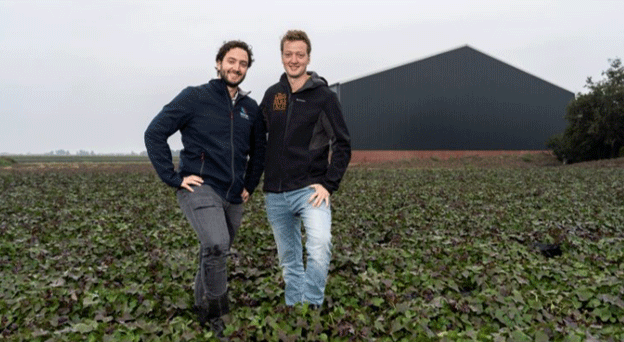From family business to sweet potato specialists
Joris and Geerd van Geel grew up on a traditional arable farm with crops such as onions, sugar beets and wheat. During his studies at HAS Green Academy in Den Bosch, Joris started thinking about the future of the company. He saw potential in growing sweet potatoes, a crop that was not grown in the Netherlands at the time. The first step? Experimenting with just 200 square meters, a modest start that would grow to 21 hectares.
The challenges of a pioneer
Growing sweet potatoes in the Netherlands was no easy task. The Van Geel brothers faced several challenges:
- Finding suitable varieties: Which varieties could handle the Dutch climate?
- Mechanization: In the first few years, everything was done manually because there were no suitable machines.
- Market development: How do you create demand for a locally grown sweet potato?
The solution lay in continuing to test and adapt. When the company grew to 15 hectares, mechanization became necessary. Together with PlantTeq, they developed a planting machine and invested in new harvesting techniques.
The power of networking: how Jumbo came on board
An unexpected factor in their success story was their mother. During a lunch at a restaurant in Breda, she enthusiastically talked about her sons’ company. This led to supermarket chain Jumbo becoming interested in Dutch sweet potatoes. The brothers are now the chain’s regular supplier, which has given their company a solid foundation.
Sustainable growth and international interest
Sustainability remains a core value within the company. By using green manures and minimal use of crop protection products, the brothers are building on their parents’ principles. Their success has not gone unnoticed: they have now had visitors from Denmark, Austria, Slovakia and even New Zealand, who are interested in their approach.
Room for pioneers in agricultural policy
Despite their success, the Van Geel brothers emphasise that regulations and legislation are often not geared towards innovations in agriculture. When they started, the sweet potato could not even be registered in the existing systems. They advocate for more flexibility and support from the government to make it easier to get new initiatives off the ground.
Lessons for other pioneers
What can other entrepreneurs learn from their journey? According to the brothers, there are three essential lessons:
- Perseverance: Challenges and setbacks are inevitable, but provide valuable learning moments.
- Taking manageable steps: Growing is good, but it must remain manageable.
- Keep networking: Sometimes a breakthrough comes from an unexpected angle – such as a conversation during lunch.
Vision for the future: small-scale circular agriculture
In addition to strengthening the position of Dutch sweet potatoes, the brothers dream of realizing a circular agricultural sector at municipal level. They believe that all the necessary elements are present to create a closed-loop system, provided there is room to think outside the box.
Question for the next pioneer
Each pioneer leaves lessons and questions for the next. The Geel brothers ask:
“If all this had not worked out, would you still have become an entrepreneur? What would you have done?”
What do you think about the challenges and innovations in sweet potato cultivation? Can Dutch farmers play a bigger role in this market? Let us know in the comments!







